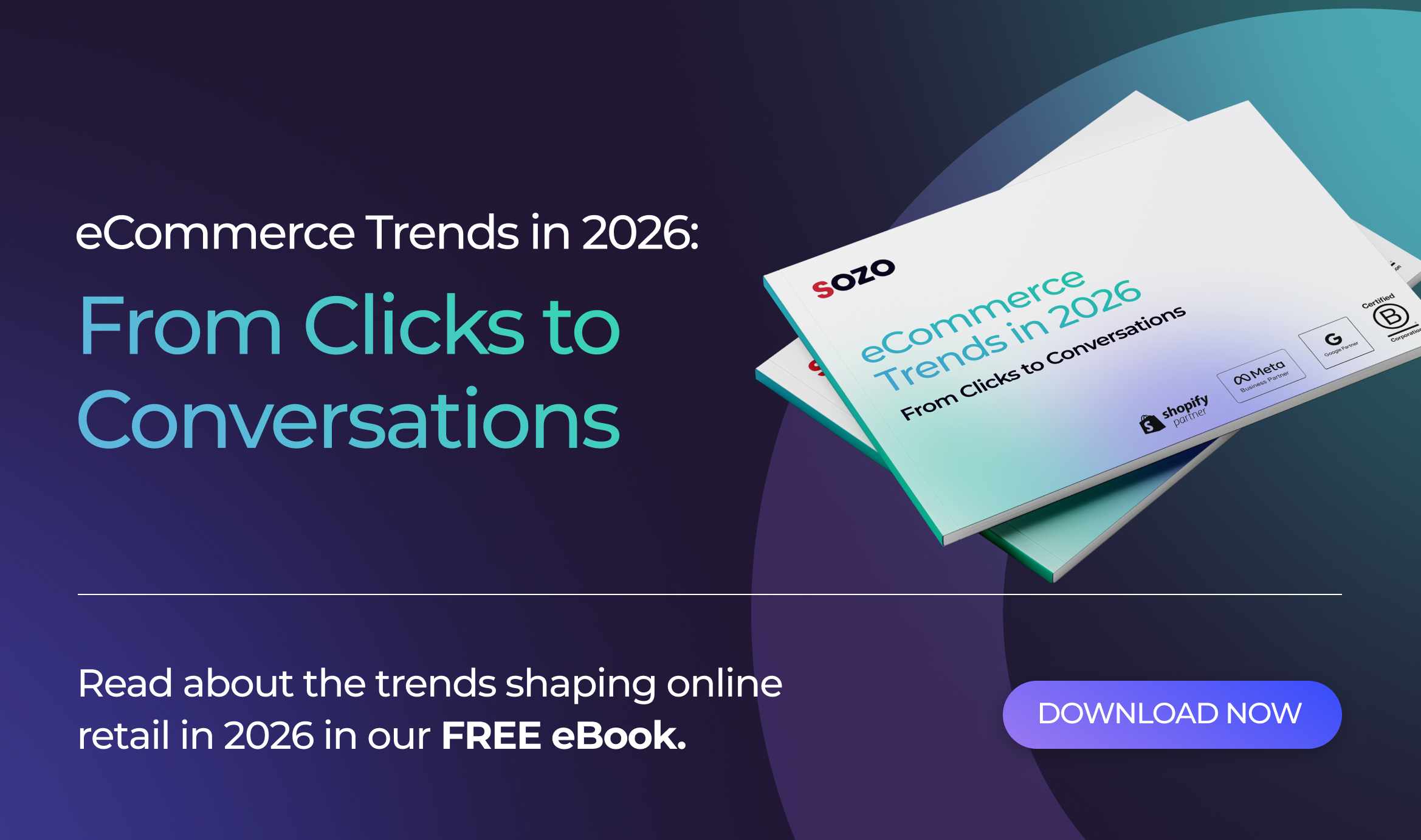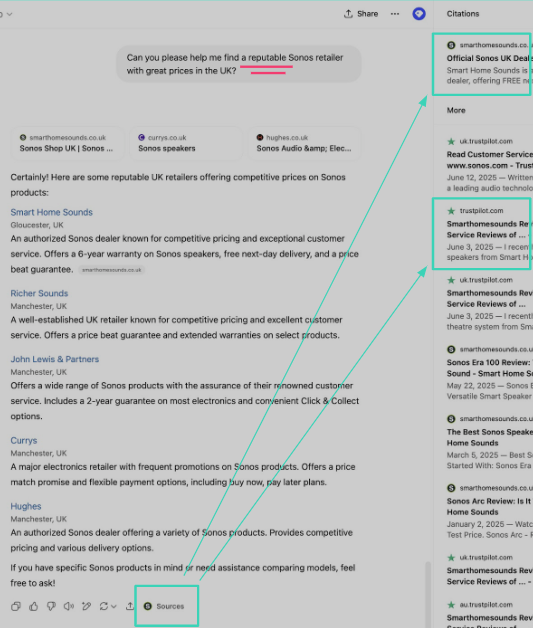Blog
AI Optimisation: The New SEO for eCommerce

Christian
Head of Search Marketing

Introduction: Discovery is Everything
For eCommerce brands, the battle for sales begins long before checkout. Success depends on being discovered in the first place; getting your brand and products in front of potential buyers at the exact moment they start searching.
Traditionally, SEO has been the cornerstone of visibility at this stage of the buyer journey; ranking highly on Google was the primary way to win new customers. Visibility above the fold meant traffic, and traffic ultimately led to sales.
But the landscape and the way people search has shifted dramatically.
Today, AI-powered tools like ChatGPT, Google Gemini, and Perplexity are increasingly the first – and sometimes last- stop for product research. Shoppers don’t just search for a list of product options, they ask deeper questions, start conversations, compare results, and increasingly rely on AI to guide them with relevant responses and recommendations.
In this environment, SEO alone isn’t enough.
Enter AI Optimisation (AIO), the new layer of visibility designed to ensure your products are recognised, trusted, and recommended by AI search engines.
For eCommerce brands, this isn’t just a nice-to-have; it’s becoming essential for survival.

How SEO and AIO differ for eCommerce
While SEO and AIO share the goal of brand discovery, and both approaches can be used throughout the buyer journey, they operate in fundamentally different ways:
SEO focuses on search engines like Google and Bing
- Keywords and content optimisation
- Technical site performance
- Backlink authority
- Meta data and structured navigation
AIO focuses on AI-driven tools
- Citations and mentions in AI-generated answers
- Authority and trust signals beyond backlinks
- Clarity and context in your content
- Semantic structure and schema markup
In simple terms, SEO helps you rank on Google. AIO helps you get recommended by AI. The two are complementary. A strong SEO foundation improves AIO potential, but AIO demands more; it requires thinking about how AI systems interpret, trust, and present your brand to users.
For eCommerce brands, a strong Black Friday strategy needs both.
For more insight, read our blog AIO v SEO and why you need both
What this means for eCommerce brands this Black Friday
Black Friday is one of the biggest shopping events of the year, making it a crucial opportunity for eCommerce brands to capture high-intent traffic and drive vital sales.
With competition at its peak, relying on just traditional SEO methods isn’t enough; brands need to be visible across all search engines and optimised for conversions.
AI-powered search is reshaping how buyers behave:
- Shoppers increasingly ask AI tools direct questions like, “What’s the best running shoe for beginners?” instead of typing keywords into Google.
- AI assistants often deliver zero-click answers, meaning the recommendation itself is the endpoint.
- If your brand isn’t represented in those answers, it effectively doesn’t exist to that shopper.
A combined SEO and AI-Optimised (AIO) strategy ensures broader organic visibility while also leveraging AI-driven insights to personalise content, predict trends, and enhance user experience.
For eCommerce, AIO is about building trust at the source. It’s ensuring your brand is recognised as a reliable authority that AI systems will choose to reference when generating answers.
Together, SEO builds authority and ranking power, while AIO helps brands adapt quickly and deliver the right message at the right time, maximising both traffic and sales during the Black Friday surge.
Read how to scale your D2C brand with a customised Shopify store

Where AIO can help ecommerce the most
An optimised AI strategy can have an impact on the entire buyer journey, from discovery through to conversion. Here’s how:
Awareness: Being Seen Early
SEO ensures visibility in search rankings, but AIO makes sure your brand is included in AI-powered shopping lists, comparisons, and recommendations. If someone asks an AI “Which reputable retailer, with great prices sells Sonos products in the UK?”, will your store be mentioned?
Consideration: Shaping the Research Phase
AI engines don’t just repeat your product specs. They review, assimilate and then summarise reviews, articles, and comparisons to give shoppers context. To be included, your content needs to be clear, structured, and backed by evidence. Case studies, customer testimonials, forum feedback and detailed guides all improve your chances of being referenced.
Decision: Closing the Sale
As well as optimised product listings, AI-can help with imagery and video content that drives conversions, plus AI-powered chat agents and recommendation tools can act as virtual sales assistants. By training these systems on your catalogue and FAQs, you ensure they guide customers toward your products rather than your competitors’.
Retention: Building Loyalty
AI can help with post-purchase engagement too; think personalised recommendations, automated content, and proactive customer support. But only if your data, content, and brand positioning are optimised for AI to understand and leverage.
Read our blog How AI Optimisation Can Supercharge Your eComm Growth| SOZO
Is your eCommerce platform ready for AIO?
Not all platforms are built with AI in mind. If you’re running on Shopify, Magento, WooCommerce, or a bespoke solution, here are the key considerations:
- Structured Data: Does your platform support schema markup for products, reviews, FAQs, and categories? This helps AI tools interpret your content more accurately.
- Content Flexibility: Can you easily create blogs, FAQs, and guides that answer conversational queries? AI tools prefer in-depth, well-structured content over keyword-heavy snippets.
- Speed & UX: Site speed and usability remain critical. AI engines pay attention to user engagement signals—fast, mobile-first, accessible sites perform better.
- Sustainability Signals: Conscious consumers are driving demand for eco-friendly businesses, and AI tools increasingly surface this information. Ensure your sustainability credentials are consistent across your website and third-party platforms.
Read our blog How to Scale with a Customised Shopify Store
Why eCommerce brands need SEO and AIO
Despite the evolution of search, this isn’t an “either/or” scenario. When used well, SEO and AIO complement each other:
- SEO ensures your brand is visible in Google search results.
- AIO ensures your brand is included in AI-driven answers and recommendations.
Together, they create a robust, future-proof strategy that maximises visibility across every platform where buyers begin their journey. Brands that ignore this strategy risk being invisible to the growing number of AI-first shoppers.
Practical next steps for eCommerce brands
To get started with AIO alongside your SEO efforts here are five must do things ahead of Black Friday:
- Audit Your Content: Ensure it answers real customer questions in clear, conversational language.
- Leverage Structured Data: Implement schema markup for products, services, FAQs, and reviews.
- Boost Your Authority: Invest in original research, case studies, and media mentions that demonstrate expertise.
- Be Consistent Everywhere: Keep your brand information updated across directories, social platforms, review sites, and industry databases.
- Optimise for Humans and Machines: Use AI tools to brainstorm and refine, but keep your brand voice authentic and human.
Conclusion: a new era of eCommerce visibility
For eCommerce brands, the battle for discovery has changed. Where SEO once ruled alone, AI-driven search has now become the new battleground. Today, winning customers means being visible not just on Google’s results pages, but also in the answers and recommendations generated by AI search engines.
For eCommerce brands, this is both a challenge and an opportunity. Those who adapt early will be the ones AI trusts, cites, and recommends. Those who don’t risk being invisible in the spaces where buying decisions are increasingly made.
At SOZO, we’re helping eCommerce brands navigate this shift. From strengthening SEO foundations to creating customised websites and implementing AIO strategies, we ensure your brand is visible wherever your customers are searching, whether that’s on Google, ChatGPT, Gemini, or beyond.
For eCommerce brands looking to thrive, SEO is the foundation, AIO is the future; together, they’re the key to eCommerce growth in 2025 and beyond.
We can help you find the formula for success. Get in touch and let us create a strategy that attracts and converts more of the right visitors.
Sign up to our newsletter
Keen to learn more about how to grow online?
Get our latest advice articles, masterclass
videos and webinars.
curious for more?


















